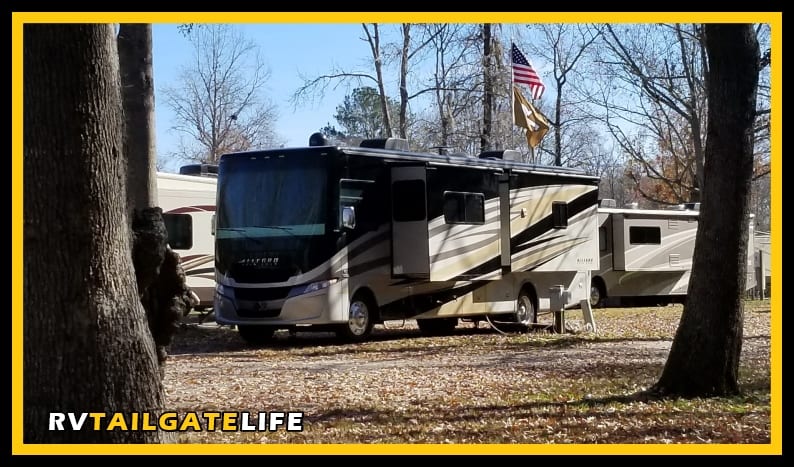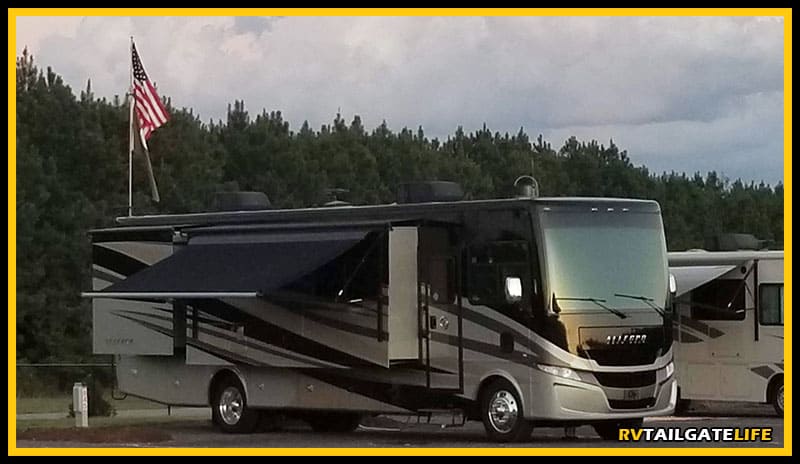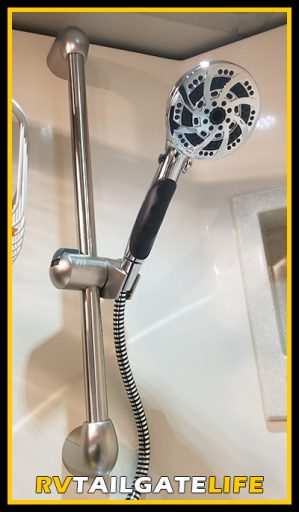Tips for Dealing with RV Odors
Bad odors and smelly situations are something that every RV owner has to deal with. One of my biggest concerns when I got Starter RV was whether I could deal with the sewer components, including smelly mishaps.
But several years in now, and things, including RV odors, are not as bad as I feared. So much so that I felt confident in upgrading to a new, more expensive Class A motorhome.
Here are my tips for keeping the smelly situation in control in your RV.

The common thread to all the tips is to regularly do a full and complete cleaning of the RV. This is extremely important before and after any long-term storage, when RV odors and other problems are most likely to occur.
An Ounce of Prevention
In your sticks and bricks house, you’ve got plenty of room for odors to dissipate. When you condense 2,000+ square feet into a couple hundred, all the odors are magnified.
When you look at what causes odors in the RV, you’ll find that you can prevent many of them with some basic preventive actions.
Cook Outside to Prevent RV Odors
Food is one of the biggest causes of RV odors and one of the easiest to prevent.
First, as much as possible, cook outside. Fire up your new Coleman grill to cook everything from breakfast to the midnight snacks. By cooking outside, you’ll keep all those odors outside. And hopefully the trash too!
While on the subject of food, make sure you clean out the fridge and the pantry of all perishable food. Don’t let food rot between games/trips as it is sure to lead to a smelly mess.
Leftover food is also likely to attract ants, mice, and other rodents, so you’ll get additional benefits beyond odor control by keeping the food to a minimum inside your rig.
See Also: How to Get Rid of Ants in the RV (Without Toxic Chemicals)
Water Problems Lead to Smelly RV Problems
Water also is a big cause of odors – mold and mildew not only cause bad RV odors but could present health issues with prolonged exposure.
Make sure that you inspect your roof during annual maintenance.
If you store your RV outside, you’ll probably have to repair the seals every couple of years, as the sun, rain, and other elements weaken it much faster than if it was sitting in a protected garage.
If you do find a water leak, you need to address it immediately to prevent mold and mildew from growing.
See Also: How to Control Humidity in Your RV

Don’t Smoke Inside the RV
And in case it needs to be said, don’t smoke cigarettes or cigars inside the RV.
We all know about the dangers of second-hand smoke and I won’t even go into the health consequences about smoking. I’ll leave that to the medical professionals.
But we all know that smoking leaves horrible smells, especially in small spaces. Like in your camper. Those odors also linger, in the fabrics and even in the wood in your RV, long after you’ve stopped smoking.
Keep the smoking for outside, because you will NEVER be able to get those smells out of the RV.
Close Up Windows Near Campfires
Speaking of smoke, one of the other big smelly problem is when the smoke from the campfire gets into your RV.
When you are parked near a campfire, you’ll want to make sure that your windows are closed and you aren’t sucking in the air with vents on the top.
Prevent as much of the smoke from getting inside, because just like with cigarettes, it is really hard to get rid of campfire smoke odors inside the RV.
It’s a big reason why I prefer propane camp fires rather than wood burning. My favorite is the Outland propane fire pit.
Ventilation and Air Circulation FTW
Many RV odors are caused by stale air. This is especially noticeable when you first open up the RV after winter storage as part of the de-winterization process.
By simply opening up the RV vents, windows and doors on the regular, you can reduce odors quickly.
As part of the monthly maintenance during the offseason, I run the generators and ventilate the rig for a few hours to keep the odors to a minimum.
Regular attention to the rig, even during the offseason, also lets you find problems that you may have failed to prevent, like those oranges that “someone” left in the sink after the championship game.
Obviously, if you couldn’t help but cook inside, you’ll want to keep the vents and exhaust running while you cook and until the odors have dissipated after you have finished cooking.

Some RV owners have installed Fan-tastic Vents which you can leave open even during rain (one reason you are probably cooking inside). I wouldn’t recommend leaving these open during the offseason, but they sure are handy during tailgates to get rid of smells quickly.
See Also: Storing Your RV in Winter with Power
Clean the Fridge Regularly
This particular tip is a combination of prevention and air circulation but focuses on the kitchen fridge.
First, prevent a smelly fridge by keeping foods to a minimum, keeping only what you will use and throwing out any expired or rotting food.
Just like in your home fridge, you can use baking soda or charcoal to absorb odors. I also recommend a small battery operated fridge fan – helps circulate the air inside (prevent stale air odors) and this one from Camco even has charcoal filters to help absorb the fridge odors.
Leave the Fridge Plugged in and Running in Storage
If possible, keep your RV plugged in during storage. It won’t take much power if you are not regularly running everything in the RV, but can help dramatically with the fridge and the odors coming from it.
Have you ever turned off and left a fridge closed up for a long period of time? Mildew and mold was sure to greet you upon your return. By leaving the fridge running on the warmest cold setting, you can avoid this problem.
If you can’t leave the fridge powered, make sure to leave it propped open to allow air to circulate, the water to evaporate, and prevent growing problems.
No matter, keep the fridge clean and you’ll give the mold and mildew less fuel to grow on.
See Also: How to Eliminate Funky RV Fridge Odors
Clean Fabrics to Prevent RV Odors
Fabrics hold odors better than hard surfaces and typically require more effort to clean.
Most RV owners remember to wash the sheets and maybe even the bedspread on the regular.
But what about the drapes? When is the last time you took them down and ran them through a washer and dryer? Drapes can collect not only horrible odors but also lots of dust, leading to allergy problems.

What about the sofa? Have you at least Febreze’d it recently?
Sometimes though, Febreeze is just not enough.
Particularly if you have pets in your RV, you will want to run a vacuum over the sofa and chairs regularly to get the pet hair up. You may also want to invest in slipcovers which can easily be removed and washed. You’ll also save a lot of wear and tear on the sofa, making it last longer. Or in the case of Starter RV, hide the hideous early 90’s blue fabric.
See Also: The Ultimate Dogs’ Guide to RVing
Look into scented wash boosters too. They act a lot like fabric softener but leave your washables smelling good longer.
In an RV that is only used on occasion, the extra smell good laundry boost can last weeks, making it a lot more pleasant for a weekend warrior.
Keeping some dryer sheets around can keep laundry smelling good too.
RV Carpets Hold Smells Too
I always forget about RV carpets since I had laminate in Starter RV and tiles in most of the new Tiffin (limited carpet along the slides).

My recommendation is to get rid of the carpet and install laminate or tiles. It’s much easier to clean and the harder surfaces typically don’t hold smells like carpet.
But if that’s not an option, be sure to regularly vacuum the carpets.
Add baking soda an hour or so before vacuuming to help with the odors – just like you would at home.
It is also easier to clean rugs than carpet, so consider putting rugs on top of the carpet; rugs are to carpet what slipcovers are to sofas. I really like Ruggable rugs which have a machine washable top. Works great in the RV!
Use code AFF10 for 10% off at Ruggable
The Favorite Topic of All RV Owners, the Waste Tanks
Black water tanks…. where do we start to prevent RV odors?
First, empty out the tanks regularly. The heat just leads to more smelly problems. This can be really bad in the South and Southwest during summer. (Ask me how I know! haha)
Due to the limited water supply in the RV, the concentration of waste to water is higher than at home and that leads to smelly situations.
As a weekend warrior, you’ve probably also got fewer worries about running out of water, so use plenty in the black water tank. The additional water will also help to make sure everything drains properly and there is not a build-up of toilet paper. Remember, nothing else goes down that drain!
Black Tank Treatments to Stop Smells
Most RV owners also use some type of chemicals to help control the black water tank odors.
Make sure that the chemicals you choose aren’t hazardous or prohibited in your state. Products containing formaldehyde are generally banned in California and by many RV campgrounds, especially those running septic systems.
Starter RV uses the Calgon and Borax combination to control black tank RV odors. I now use RV Black Tank Cleaning Bombs to control black tank RV odors and to keep the tank from getting clogged.
See Also: How to Poop in an RV Toilet
RV Gray Tanks Smell Too
You probably don’t spend as much time on the gray tanks as the black tanks, for obvious reasons. They just don’t smell as much as black tanks do. But that doesn’t mean that they don’t smell.
Never send food waste down the kitchen sink. This isn’t your home kitchen sink with the garbage disposal and the pipes taking away the waste. One fellow tailgater told me the story of the shrimp peels that got in their gray water tank – and it doesn’t end well.
Related to the waste water tanks are the p-trap drains leading out of the shower and kitchen and bathroom sinks. When you put your RV into storage, bacteria can grow in these traps.
Mix some baking soda in a gallon of water and pour some down each sink and the shower. Whatever is left can do down the last sink, to help maintain the gray tanks.
See Also: Fix Awful RV Shower Odors
Sewer Smells at RV Campgrounds
When you are staying at an RV campground with a full hook-up, it is really tempting to leave the sewer valves open. This means that you don’t have to worry about the tanks getting full in the middle of your shower.
But for many reasons, leaving the sewer valves open is a really bad idea! But for this article, it’s because it allows those sewer smells to come up into the RV.
Sure, your black tank has a vent that should allow the smells to escape up and out of the RV. But that vent doesn’t always work to keep ALL the smells away. Why not prevent the odors from ever getting into your RV in the first place?
Read More: Do You Leave Black and Gray Tanks Open or Closed?
Manage the Freshwater Tanks
The freshwater tanks may not lead to quite the problems that the waste tanks do, but the freshwater tanks can lead to many RV odor problems.
We will start by going back to our first point – prevention is the key here. Don’t leave the freshwater tanks full during long periods of storage.
The water will stagnate and bacteria can grow in it, leading to more than just smelly problems. So drain those freshwater tanks if you aren’t going to be using the RV for a few weeks.
After long periods of storage and if you happen to get a bad tank of water full of sulfur, you’ll need to sanitize the tanks.
You sanitize the tanks by adding diluted bleach and water then filling and emptying the tanks several times until you no longer smell the bleach.
Read More: How to Sanitize the RV Fresh Water System

The Smelly Awning
Wait, the awning smells too?
You’ll know just how smelly an awning can be the first time you pull it out after storage.
If you are like me, you can store the RV at your house and perform regular monthly maintenance checks during the offseason. I’ve mentioned running the generators and venting the inside, but I also try to pull the awning out to let it air out as well.
This works best on a sunny day when the sun can dry the awning out completely before it is rolled up again.
For particularly smelly situations, a good cleaning can do. Pick up an awning cleaner that also has UV protection in it to keep your awning look better for longer.
See Also: RV De-Winterizing: Getting Ready for Spring Camping and Tailgating
And Sometimes You Just Have to Mask the RV Odors

While it is not ideal, sometimes there is only one thing left to do to deal with RV odors – mask them!
Since many odors are caused by bacteria, I recommend an air disinfectant that also smells good.
Some of the disinfectant sprays can be used on hard surfaces like the kitchen countertop, soft surfaces like the fabric sofa, and in the air. You know us RV owners, always looking for multiple uses out of one product, so the Lysol disinfecting spray fits the bill.
You’ve probably seen these satchels on Pinterest, as I did. I decided to test out this little project with some of the leftover laundry booster after I washed the sheets. The little mesh organza wedding bags (available from Amazon for cheap) are filled with the laundry booster and then left inside the RV.
I have put a couple of them around the RV – one hangs from a hat hook over the sofa (see picture) for maximum air circulation and another in the over-the-door organizer in the intersection between the kitchen, the bathroom and the closet. They do actually work to provide a pleasant scent without overpowering the small space.
Good luck in keeping the bad RV odors to a minimum! Hopefully, some of these tips will help you.
When All Fails, Bomb The RV
I don’t mean to literally blow it up. But you can set off a chlorine dioxide “bomb.”
The chlorine dioxide gas penetrates into places that you’ll never otherwise be able to get to – in the cracks and crevices of the RV. Behind the sofa. And it is non-toxic and safe for the environment!
Just make sure you open the cabinets and help the gasses get into the hard to reach places. Leave the RV closed up for at least 4 hours, better about 24 hours.
Set off a Biocide RV Shocker Deodorizer to kill any lingering smells in the RV.
of RV Shocker Deodorizer when ordering directly from Biocide!
How do you handle RV odors in your rig?

Comment below with your best RV odor controlling tips!
Like these tips to deal with RV odors? Pin for later!
You May Also Like:
7 Common RV Mistakes to Avoid
Tips for RVing in Severe Weather
The 100 RV Decluttering Challenge



Clean every day when using an RV. Washable slipcovers & rugs. Run the A/C set at 80F to abate mold in storage. Heated towel rack dries towels & everything else. Keep the laundry hamper outside & dispose of garbage daily. Wipe down damp shower walls/sinks with scented dryer sheets. Flush a bag of crushed ice & baking soda down your toilet before heading out to ‘scrub’ the interior. Use quick-dry sheets/towels/clothing.
Mick, lots of great ideas here.
Wish I could run the A/C while in storage, but I’m limited on my power since I don’t have a 30 or 50 amp hookup. I do run a dehumidifier which helps though. It just doesn’t take as much power as the A/C.
Also, the bag of ice doesn’t really work. I mean, all the ice would be melted before I could hit the road. The water, though, does wonders for both the black and gray tanks.
Thanks,
Kimberly